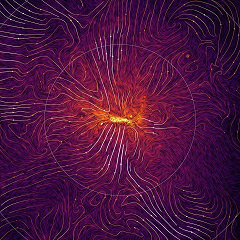The evolution of baryons across scales
The interstellar medium is far from a homogenous atmosphere of galaxies. It is a turbulent, multiphase environment, with dramatic variation in temperature, density, magnetization, ionization, velocity, composition and abundance. How matter evolves in galaxies, from diffuse and hot gas to dense and gravitationally stable structures and then stars, is not clear. In particular how energy, mass and momentum is transported from the circumgalactic medium, to Galactic scales and down to AU scales is still to be understood. This involves understanding the details of matter and energy injection mechanisms at large scales, the interstellar turbulence cascade, phase transitions, various instabilities, as well as the impact of gravity and stellar feedback in the context of the formation of dense gas.
We have made progress in understanding the role and importance of the complex ISM physics in the star formation process by studying these features in groups of clouds in the Galactic disk, in nearby galaxies and in the CGM. Moreover, massive numerical simulations allow the exploration of the complex nonlinear baryon physics. Nevertheless many difficulties rest in obtaining clear and general observational results about the nature of the star formation process in a context of circulation of matter and energy from the halos of galaxies down to molecular clouds. This working session of the Interstellar Institute is devoted to extending the scope of ISM studies to larger scales, looking outside the Milky-Way and at nearby galaxies to better understand the global structure formation process.



